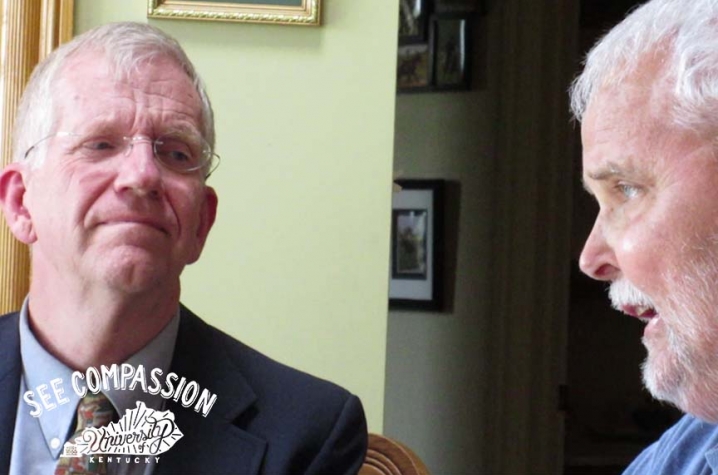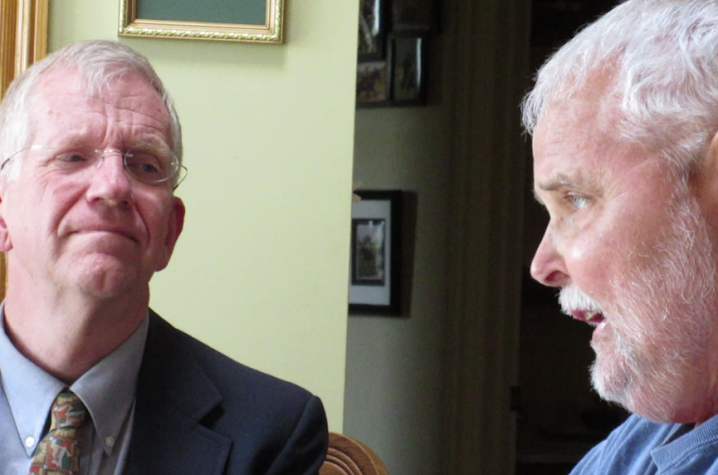Markey's Narrative Medicine Programs Helps Heal Mind and Body
LEXINGTON, Ky. (May 14, 2015) – Storytelling has always been an essential part of the human experience. From prehistoric tales of the hunt, to fairytales, and even modern blockbusters, stories have reflected the culture, values and experiences of not only the characters but the storyteller himself.
Though storytelling has always been a powerful force in society, only recently has its power been used to encourage healing. The University of Kentucky Markey Cancer Center is working to recognize the powerful patient stories that result from a cancer diagnosis and use these stories to help patients through a method known as narrative medicine.
During a narrative medicine session, patients sit one-on-one with a health professional to share their personal stories, whether it's as simple as their actual day-to-day experiences or their emotional journeys. As patients share their unique experiences, the narrative medicine facilitator will help to tease out important details and insights and help patients use their story as a way to cope and recover mentally.
Video produced by UK Public Relations & Marketing. To view captions for this video, push play and click on the CC icon in the bottom right hand corner of the screen. If using a mobile device, click on the "thought bubble" in the same area.
Though talking points vary greatly from patient to patient, one thing that remains consistent in each session are a series of questions asked by Markey's Narrative Medicine Facilitator Robert Slocum.
"What is your source of hope?"
A cancer diagnosis changes a person's life overnight. For many people, fighting cancer can mean taxing treatments, unexpected financial burdens, time away from loved ones and time away from activities they enjoy. It can be easy to focus on treatment, and healing the body, and forget about the toll that the experience takes on the mind.
At Markey, staff is always concerned with finding ways to keep patients engaged and maintain their sense of hope throughout treatment.
Slocum believes that one way to achieve this is through patients sharing their story and experiences.
"This is a person who happens to have cancer," Slocum said. "A person with a life, with dreams, hopes, responsibilities, and ways to share. Staying connected to that during the process of treatment can be very important."
Many patients are open to sharing their experiences but are unsure of how to do it. They feel holding these conversations might burden loved ones or health professionals. They might feel that their personal experience is not important.
Narrative medicine is a chance to express to them that their experiences do matter.
"It is important to hear again and again that we are here to listen," Slocum said. "We want to hear your experience. Your experience matters. That can be the opening that many people felt 'oh there was never a good time to talk,' well, this is a great time to talk."
This adjunct therapy becomes especially helpful for cancer patients in isolation, where they may be confined to a room with few approved visitors for a month or more. Lola Thomason, the patient care manager for Markey's blood and marrow transplantation and medical oncology floor, notes that these patients are at a particularly high risk of developing psychosocial issues, simply due to lack of interaction and conversation.
"Narrative medicine gives patients an opportunity just to get their story out," Thomason said. "Just being able to get those feelings off their chest means so much to them."
Slocum is frequently referred to patients by Thomason and her team, a system that is working well so far.
"Lola has a sixth sense for who needs to be seen and when they need to be seen," Slocum said.
"Where do you get your strength?"
There is, without a doubt, strength that comes from being able to share your personal story.
When Slocum holds these important conversations with patients, he focuses on helping patients discover what their personal strength is and helps them find the strength to share their experience with others, if they choose.
"It is possible to draw out and draw on a patients sense of strength," Slocum said. "It is an opportunity for a patient to come to a clearer understanding of their life and what they are going through presently in the context of everything they have faced before."
Narrative medicine begins with a referral from a health professional and a simple conversation.
"It can be simply 'how are you feeling today', 'what brings you to the hospital' or 'how has treatment been going'," Slocum said. "That can be the start of a conversation that begins to go a little bit deeper."
Once patients choose to participate in narrative medicine, they can share their story in the way that they are comfortable. Patients are free to share as much or as little as they would like to. The purpose is for patients to begin to share their story and also provide an opportunity for them to process their experiences.
One of Slocum's patients at Markey, Dr. David Gagnon, has been very open to sharing his experiences dealing with a rare blood cancer and subsequent brain cancer diagnosis.
Gagnon has a unique story to tell as both a doctor and a cancer patient. Because he understands the doctor and patient viewpoint, he has gained an understanding of the importance of sharing experiences and emotions.
"Patients who don't talk don't seem to do well," Gagnon said. "I have found that talking and sharing with physicians and other patients who are going through this is helpful for me and helpful for them."
During his session with Slocum, Gagnon's topics run the gamut of his life experiences, including thoughts on his career as a physician, to his hobbies and fitness goals, to his spirituality. While Gagnon has an interesting perspective, every patient offers a unique viewpoint that Slocum hopes to help draw out and build upon as a source of strength for the patient.
"Patients come in all sizes, shapes, backgrounds and with different perspectives," Slocum said. "I try to work with whoever they are and whatever they bring."
"What gives you the courage to face the future?"
For some patients, narrative medicine has allowed them to find the courage to share their story with others. This might mean sharing what they are feeling with family members or even writing it down for other patients to read and hopefully relate to.
Many patients come out of a narrative medicine session with a fresh outlook on their treatment, and on life in general.
"I've had patients say wonderful things about how their perspectives have changed in cancer treatment," Slocum said. "They don't take things for granted anymore. Cancer is a terrible diagnosis, but it's also a second chance."
*****
Narrative medicine is just one of the ways that Markey has worked to foster hope, strength and courage in their patients. Their integrative medicine program helps to find alternative medicine practices that complement a patient's existing treatment. Markey offers a wide range of integrative programs including narrative medicine, art therapy, music therapy and Jin Shin Jyutsu.
For more information on narrative medicine or for referrals, contact Robert Slocum at (859) 324-0955 or robert.slocum@uky.edu.
MEDIA CONTACT: Allison Perry, allison.perry@uky.edu or (859) 323-2399






